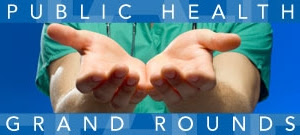
We are pleased to present the September session of CDC Public Health Grand Rounds, “Preventing A Million Heart Attacks and Strokes: A Turning Point for Impact.” This session will be available via live webcast from CDC headquarters in Atlanta, Georgia on Tuesday, September 16, at 1 p.m. (EDT) athttp://www.cdc.gov/
Heart attacks and strokes contribute to the almost 800,000 deaths from cardiovascular disease each year. The trauma to families and communities is devastating; the cost to the US economy is nearly $1 billion each day in medical costs and lost productivity. To achieve sustainable prevention, the Department of Health and Human Services launched Million Hearts®, a national initiative to prevent one million heart attacks and strokes by 2017. Million Hearts® focuses the efforts of federal agencies, states, regions, communities and individuals on this common goal, ensuring the coordination of public health, clinical care and policy approaches to this complex problem.
Million Hearts® focuses on increasing the number of communities who go smoke-free, decreasing sodium in the food supply, and eliminating trans-fat. In addition to changes to our environment, Million Hearts® calls for changes in the health care system that will produce better performance in the ABCS (Aspirin when appropriate, Blood pressure control, Cholesterol management, Smoking cessation).
Join us as we hear about the progress that has been made, along with the work that is still needed, to reach the goal of preventing one million heart attacks and strokes by 2017. Specifically, we’ll hear how public health and clinical care experts are coming together in communities to improve blood pressure control, how comprehensive tobacco policy efforts can have statewide impact, and how efforts to promote healthy nutrition can occur through increasing the availability of lower sodium products.
As Million Hearts® approaches its half-way mark, we need to accelerate that progress. There is a role for local and state governments, individuals, local and national organizations, providers, health care systems and insurers. Together, we can send a clear signal that cardiovascular events can be prevented when each of us takes a few, specific, impactful actions. Please tune into this grand rounds to learn what you can do to help prevent heart attacks and strokes.
Future Grand Rounds topics include: Utilizing Pharmacists to Improve Our Nation’s Health, Unusual Donor Derived Transplant-associated Infections and Climate and Health.
Email your questions about this topic before or during the session. Follow us on Twitter #cdcgrandrounds
Presented By:
Janet Wright, MD
Executive Director, Million Hearts®
Division of Heart Disease and Stroke Prevention
Centers for Disease Control and Prevention
“Million Hearts: Where We Are and Where We Need To Go”
Andrew Tremblay, MD
Chair, Department of Primary Care
Cheshire Medical Center/Dartmouth-Hitchcock
Keene, New Hampshire
“Success in Blood Pressure Control: 2013 Million Hearts® Hypertension Control Champion”
Patricia P. Henley, MEd
Director, Office of Community Health and Tobacco Use Prevention
Massachusetts Department of Public Health
“Tobacco Use Prevention in Massachusetts”
Patricia L. Cummings, MPH, PhD
Program Manager, Sodium Reduction Initiative
Epidemiologist, Division of Chronic Disease and Injury Prevention
Los Angeles County Department of Public Health
Los Angeles County Department of Public Health
“Partnerships to Improve Cardiovascular Health through Sodium Reduction in Los Angeles County, California”
Facilitated By:
John Iskander, MD, MPH, Scientific Director, Public Health Grand Rounds
Phoebe Thorpe, MD, MPH, Deputy Scientific Director, Public Health Grand Rounds
Susan Laird, MSN, RN, Communications Director, Public Health Grand Rounds
For non-CDC staff or those outside of the CDC firewall:
A live external webcast will be available. Presentations are archived and posted 48 hours after each session. Due to security measures at CDC’s Roybal campus, non-CDC staff who wish to attend these sessions in person must have prior clearance and a U.S. state-issued photo ID (e.g., driver’s license, U.S. passport).
Names of non-CDC staff (both domestic and international) who wish to attend these sessions in person should be submitted to the Grand Rounds Team. Please note that all information for international visitors must be submitted at least 10 days in advance.
For CDC staff requiring reasonable accommodations:
It is the policy of CDC to provide reasonable accommodations (RA) for qualified individuals with disabilities to ensure their full inclusion in CDC-sponsored training events. Employees are asked to submit RA requests at least two weeks prior to the training event. Please e-mail the request to grandrounds@cdc.gov.
Grand Rounds is available for Continuing Education.
ALL Continuing Education hours for PHGR are issued online through the CDC/ATSDR Training and Continuing Education Online system. If you have questions, e-mail or call Learner Support at 1-800-418-7246 (1-800-41TRAIN).
Those who attend PHGR either in person, Envision, IPTV, or “web on demand” and who wish to receive continuing education must complete the online seminar evaluation. Thirty days from the initial seminar the course number will change to WD2346 and will be available for continuing education until February 18, 2016. The course code for PHGR is PHGR10.
Target Audience: Physicians, nurses, epidemiologists, pharmacists, veterinarians, certified health education specialists, laboratorians, others
Objectives:
- List key measures of burden of disease involving morbidity, mortality, and/or cost.
- Describe evidence-based preventive interventions and the status of their implementations.
- Identify one key prevention science research gap.
- Name one key indicator by which progress and meeting prevention goals is measured.
CE certificates can be printed from your computer immediately upon completion of your online evaluation. A cumulative transcript of all CDC/ATSDR CE’s obtained through the TCE Online System will be maintained for each user. We hope that this will assist CDC staff and other public health professionals to fulfill the requirements for their professional licenses and certificates.
Learn more about continuing education on the Grand Rounds website.





















.png)









No hay comentarios:
Publicar un comentario